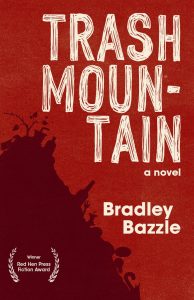Book Review
Are each of us destined, sooner or later, to live and work on the rugged slopes of our own accumulated refuse? It certainly feels that way inside the reality of Bradley Bazzle’s debut novel, Trash Mountain, which finds teenager Ben Shippers locked in a personal struggle with a pile of garbage that is both his obdurate foe and his only hope of a better life.
As the novel begins, Ben and his family live in the mountain’s shadow, and he blames its toxic aura for his beloved sister’s poor health (“weird spine” is the diagnosis). Thus he begins hatching schemes to destroy it. His Molotov cocktails have minimal effect, so he hustles to save for a monstrous “Red Dragon Torch Kit,” remarking innocently to a friend that the incinerated dump might be replaced by a “super fun site.”
While this opening suggests a mischievous tale of obsession, casting Ben as an adolescent Ahab with a flamethrower, that turns out to be deceptive. Trash Mountain is, at heart, not a novel of whimsy, but one of grit and decay, with a meandering narrative that finds our hero, quite realistically, distracted from his grand mission by the ordinary forces of youth: lackadaisical parents, suspect friends, and a need for petty cash.
It all plays out in the twin cities of Komer and Haislip—racially segregated, declining American towns where the only growth industry is termed “sanitation,” one of those chilling corporate euphemisms that really means the opposite of what it purports to describe. While there’s a healthy dose of humor in the story, and a little bit of adventurous intrigue, it’s permeated by a real sense of despair and hopelessness. Again and again, Ben is failed by a broken system and a demoralized community.
In one affecting scene, Ben discovers his mother in diabetic shock and calls an ambulance. She’s transported to the hospital and treated, but then, with no way to get home, Ben ends up pushing her wheelchair along the side of the highway for two hours, both of them getting badly sunburned. In health terms, the outing is a wash at best, and it’s reported in an offhand style that adds to the horror. It never occurs to Ben to ask for help, or that there might be an alternative to this needless suffering. For people like the Shippers, it’s business as usual.
With problems like this, it’s no wonder Ben’s quest of righteous arson is sidetracked for years as he tries to make ends meet and figure out who he wants to be in the world, given the narrow options presented to him. “What were my ideals anymore? What had they ever been?” he asks himself during a crisis of faith about whether he still wants to destroy Trash Mountain, or if he’d rather make a dazzling ten dollars an hour working for its owner, an off-kilter local politician named Whitey Connors.
He gets virtually no guidance in answering those questions from the large cast of characters who drift in and out of the story. Ben is our only steady companion through this world of aimless, unmoored people. His only steady adult voice comes from a memoir called The Highest Mountain by fictional climber Bob Bilger, Komer’s most famous son. Even here, it’s a dubious font of wisdom: Bilger’s book is full of faux-inspirational hokum and militaristic braggadocio, and though it’s required reading in Komer schools, Ben seems to be the only the person who likes it. He refers to Bilger as a “great adventurer,” while another character dubs him—more accurately, you sense—“a windbag.”
In this leaderless vacuum, Ben falls in first with a group of reprobate teenagers, and later with some vagabonds who rummage the foothills of Trash Mountain for recyclables and discarded cellphones. The scenes as Ben learns the scavenger’s trade (and reconnoiters enemy territory) have a touch of the comically absurd about them, but can also be read as stark realism—certainly the millions around the world who earn their living as waste pickers, on real-life Everests of garbage, would see nothing fantastical about it.
And this is what’s most intriguing, and a little frustrating, about Trash Mountain as a novel. It never quite settles on a tone, but keeps the possibility of satire and verisimilitude afloat simultaneously. You’re never sure which one you’re going to get from scene to scene, or whether even Bazzle is entirely certain which effect he’s going for. For instance, the pompous, larger-than-life characters, such as Bob Bilger and Whitey Connors, can feel jarring set against someone like Demarcus, a quiet schoolmate from the predominantly black side of town, whose thoughtful, vaguely tragic presence bookends the story.
Still, Bazzle shows that he has the chops to write in multiple registers, and in the end, cold reality wins out: a kid like Ben can’t afford the single-minded zealotry of Ahab, and he can’t redeem the world with fire. He’s got a sister to think about, a future to carve out for himself—tasks that demand compromise. Suspense around the fate of the landfill lingers into the final pages (will he get his “super fun site” after all?), but by that time, it’s almost beside the point. Ben will never be free of Trash Mountain. It’s not a place so much as a force circumscribing his life; it’s not a peak to summit or flatten, but one to pick his way across, keeping an eye out for treasures in the trash.
About the Reviewer
Benjamin T. Miller is a writer whose fiction and essays have appeared in ZYZZYVA, Santa Monica Review, Epiphany, Hobart, and others. He earned his MFA from UC Irvine, and lives in Durham, North Carolina.
